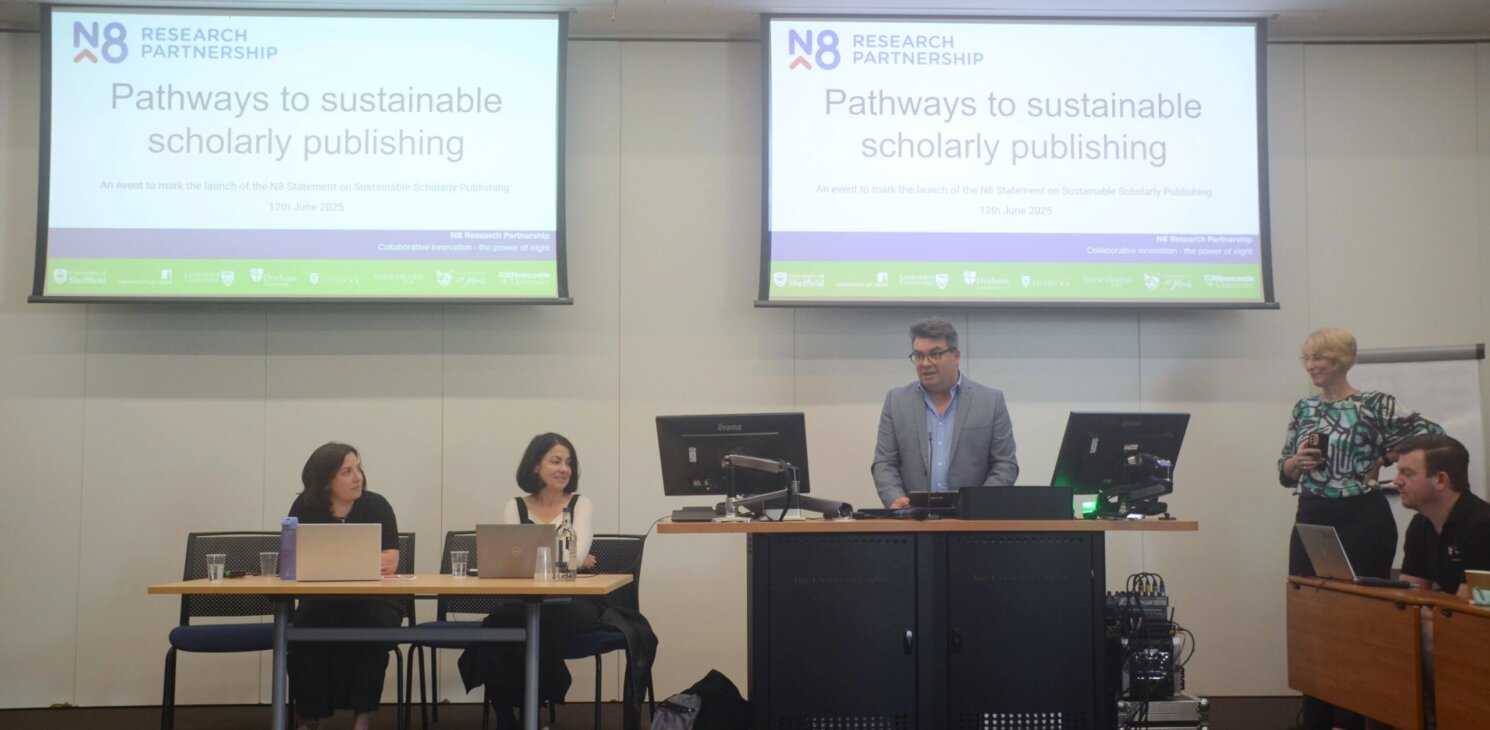
On Thursday 12th June, the University of York hosted an event to mark the launch of the N8 Research Partnership’s statement on Sustainable Scholarly Publishing.
The statement, developed collaboratively by senior leaders across the N8 universities – including Library Directors, Pro-Vice-Chancellors for Research, and Vice-Chancellors – called on publishers to shift away from operating in a manner that no longer serves the interests of academic communities and offers limited innovation in how research is disseminated.
The ‘Pathways to sustainable scholarly publishing’ event was hosted at York Law School and was opened by Professor Sarah Thompson, University of York Pro-Vice Chancellor for Research, who declared that the launch of the new statement represented a moment “to be proud of the N8” and an opportunity to celebrate the collaborations that enable the collective’s libraries to be pro-active and forward thinking.
Sarah outlined that an active conversation with publishers is particularly critical at this moment in time due to the acute financial challenges universities are facing. She described the statement as an extremely welcome intervention from the N8, affirming as it does its members’ commitment to collaborating and influencing the future of sustainable scholarly publishing.
Further context to the launch of the statement was then provided by Kirsty Lingstadt, Director of Library, Learning, Archives and Wellbeing at York, who said:
“Following the N8’s Rights Retention activity in 2023, we looked at what we could do next. Scholarly publishing was in a difficult place, and there were certain challenges thrown into sharp relief by the financial situation facing the sector. Scholarly publishing is a core part of the research, infrastructure and eco-system that we find ourselves in but we’re increasingly having to make difficult choices due to rising costs. As such, making open access available to all has become harder and harder as we’ve moved along.
“It’s definitely left us with a landscape where we have those institutions that can afford access to research and content and those who are really struggling to pay for that access.”
The afternoon’s next speaker was Professor Christopher Pressler, John Rylands University Librarian at the University of Manchester and chair of the N8 Library Directors’ Group, who delivered a succinct summary of what the N8’s statement hopes to achieve:
“The future of academic publishing isn’t just about making research freely available. It’s about reimagining how knowledge moves through our interconnected world – ensuring that discovery and innovation serve all of humanity, not just those with institutional subscriptions or deep pockets.
“The N8 Research Partnership has long maintained that true academic excellence cannot thrive behind paywalls. Our universities have shown that collaboration – not competition – drives meaningful change, as evidenced by our collective leadership in open access initiatives.
“Today’s launch, and the earlier release of our groundbreaking Rights Retention statement, demonstrate what is possible when institutions unite around shared principles. Together, we can challenge the entrenched systems that have dominated scholarly publishing for decades.”
However, Christopher was also clear about the challenges that lie ahead.
“Much of the academic world remains tethered to outdated norms,” he explained. “Clinging to impact metrics and this obsession with prestige over accessibility sustains publishing models that extract enormous profits from publicly funded research, and upholds systems that exclude voices from the Global South and under-resourced institutions.
“These aren’t just inefficiencies – they are injustices. The future we envision is radically different. A future where research findings reach every corner of the globe instantly. Where a brilliant insight from a researcher in Bangladesh has the same visibility as one from Boston.
“Our mission is nothing less than changing the world. One publication, one partnership, one courageous decision at a time.”
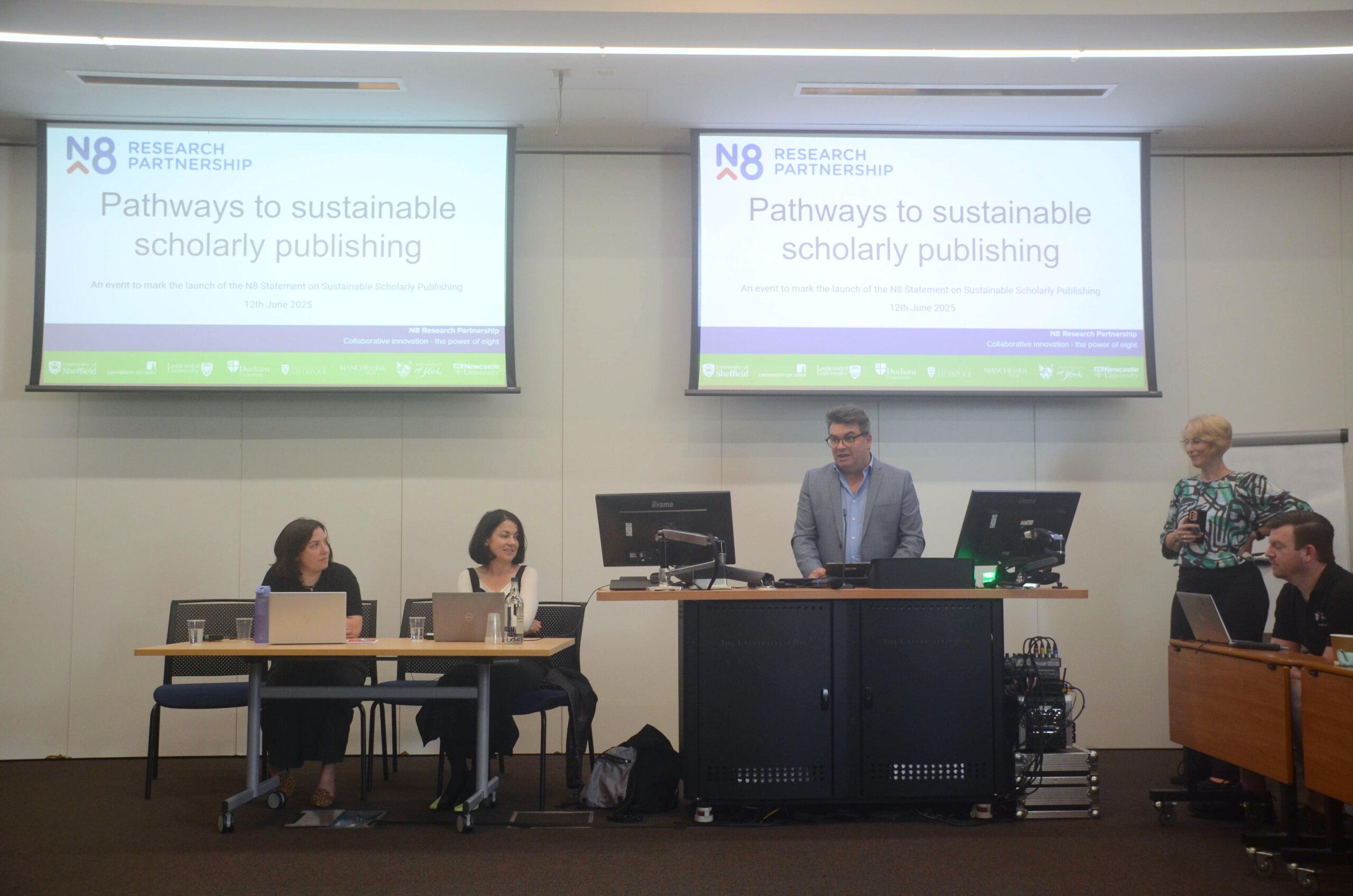
Insights from sector bodies
It was then time for the event’s first panel discussion, chaired by Anna Clements, Director of Library Services and University Librarian at the University of Sheffield. Participants were Anna Vernon, Head of Research Licensing at Jisc and Sara Ball, Strategy Lead for Open Science, UK Research & Innovation (UKRI).
Both participants provided presentations, with Anna beginning by thanking the N8 for its “bravery, commitment and leadership” in putting together this “inspiring statement”.
Anna subsequently went on to discuss Jisc’s work in next generation open access. This approach aims to support the higher education sector’s strategic priorities – particularly financial sustainability, collaborative efficiencies through collective negotiations, and improving research culture. The UK’s work in open research is internationally recognised, Anna noted, with other countries observing and adopting similar models.
Jisc’s strategy has two main goals:
- Help institutions respond to financial pressures.
- Enable broader, more inclusive participation in research, including access to and the ability to publish open research.
These goals are interlinked: increasing inclusivity in research and publishing will, over time, support the financial sustainability of publishing agreements.
Anna emphasised that access to high-quality scholarly literature is essential for research and teaching. While the role of publishers is evolving and sometimes debated, they are still critical. Open and transparent research strengthens integrity, reproducibility, and trust in research.
Furthermore, expanding participation in open science enhances research impact, collaboration, and readiness for technologies like AI, ultimately delivering greater public value from the current investment in scholarly communication.
Anna then provided an update on current negotiations with publishers. The aim, she outlined, is to support the adoption of non-article based models by the top five to help move away from the high cost, high growth paradigm for models and to evaluate the extent to which all publishers are inhibiting or encouraging greater inclusion and participation in research
Success, Anna said, will see the reduction of costs and commitments from publishers to sustainable article growth and more inclusive models, along with agreements that can be extended to NHS trusts, charities and other research-producing organisations.
Next up, Sara Ball discussed supporting a sustainable transition to open access. Sara outlined that open access has long been a priority for the UK government, and how as the UK’s largest funder, UKRI has a role and responsibility not just to fund research, but also to work with partners across the sector to shape a more inclusive, dynamic, productive, sustainable and trusted system as well.
Sara also provided insight on the UK government’s approach to research culture: “Our aim is to shift to a research culture that supports rather than hinders people or their teams to pursue ideas. We want them to seek to stimulate more open, transparent and collaborative research.
“Open research supports faster and more efficient research. We saw those benefits during the Covid pandemic – how open research underpins integrity, reproducibility and public trust. It supports greater impact through that reach and, importantly, it maximises the value from public funded research.”
In response to a question from the audience on how the Research Excellence Framework (REF) could support such measures, Sara outlined how the most recent REF guidelines outlined support for green repository, open access and features an explicit reference to new publishing platforms.
A subsequent question touched upon the transparency of what it costs to publish academic research, and if it’s possible to compel commercial publishers to give away proprietary information about their actual publishing costs. Anna explained that they had stopped asking the big commercial publishers to justify their Article Processing Charge (APC) costs and they are more willing to engage with questions around sustainable article growth, research integrity and the processes that they’re putting in place to safeguard the scholarly record.
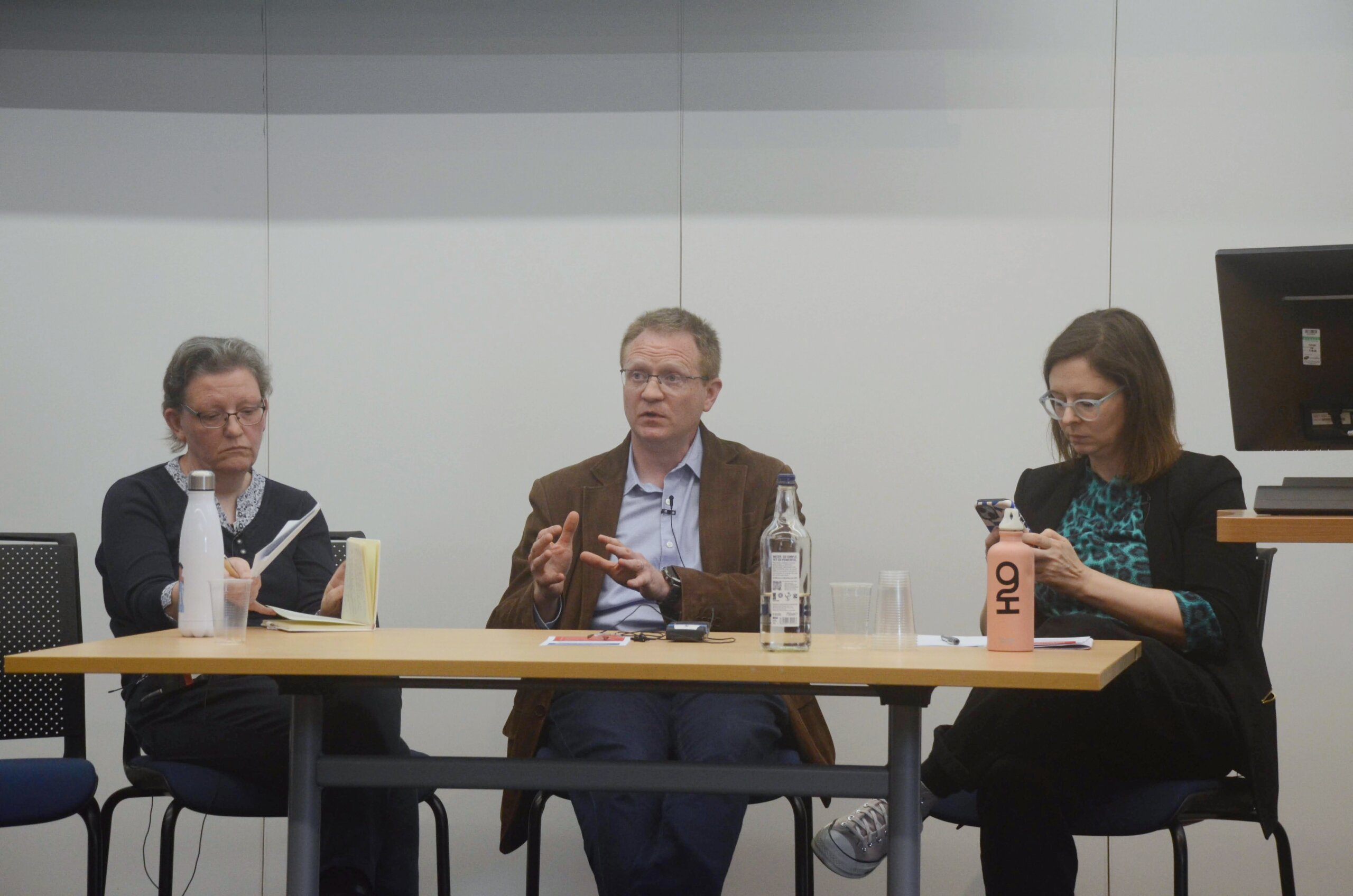
Exploring alternative models
The second panel session was chaired by Sarah Thompson, Associate Director of Libraries, Archives & Learning Services at the University of York. This session featured presentations from three scholarly publishers who have already made strategic commitments to supporting open science and introducing sustainable open access business models, reflecting the missions of their parent organisations and societies.
Dr Caroline Edwards, Executive Director, Open Library of Humanities, and Senior Lecturer in Modern & Contemporary Literature at Birkbeck, University of London spoke first. Caroline discussed her recent work founding the pioneering Open Journals Collective (OJC), a Diamond publishing initiative formed of libraries, scholars and university-based publishers. The OJC aims to bring more academic journal publishing back in-house at universities by offering a scalable pathway to migrate existing journals away from commercial publishers, and away from subscription models. It builds on the decade of experience Caroline has had with the Open Library of the Humanities working with unhappy editorial boards to move (‘flip’) their journals away from a commercial publisher to a community-led model.
The OJC will open a call for library investment in September. At launch (January 2026) there will be two collections, one of around 200 journals in the humanities and social sciences, and a STEM collection of around 50 titles. All journals in the launch collections already operate under the diamond model. From 2027, the OJC will begin to add journals which have moved to one of its publishers and flipped away from subscription models.
“We are strengthening already existing infrastructure in the diamond non-profit, scholar led publishing ecosystem, which is in a very lively and exciting period right now,” explained Caroline.
“We’re not reinventing the wheel – we are just consolidating what already exists. We are asking for libraries to consider our journals as part of their collections budgets, rather than as marginal within library budgets. More than this, we are asking librarians to help us craft the future of scholarly journals publishing. We’re going to build a better alternative to transformative agreements because, as discussed today, they are fundamentally inequitable.”
Following this, Clare Curtis, Director of Content and Engagement at the Biochemical Society/Portland Press, provided insight into her organisation’s transition to open access. The Biochemical Society is a learned society founded in 1911 in the biochemistry/molecular bio sciences field and Portland Press is the society’s wholly owned publishing arm, with all the profits from the publishing activities returned to the society to carry out their charitable objectives.
“In 2017, Portland Press made the commitment to move towards a fully open access publisher, and we had to really think about how this could be achieved because we didn’t want the ability to publish being linked to an individual researcher’s ability to pay,” said Clare.
“We were and are still partnered with Research for Life, so we do offer waivers and discounts on article publishing charges, but we really didn’t think this would be enough to move to full open access. We also acknowledge that institutions that financially support research publishing do have their funds tied up in subscriptions. We were therefore really trying to think about how we could repurpose that subscription money to support open access models.”
In 2020, a groundbreaking unlimited Read and Publish model was introduced after broad stakeholder consultation. It offered corresponding authors at participating institutions unlimited open access publishing across all journal types, along with full read access to the entire journal archive. Streamlining workflows and boosting equity, the model lifted financial barriers for researchers, enhanced institutional ROI, and significantly increased open access content.
In June 2023, the society’s green open access policy was revised to remove the embargo period, allowing authors to deposit their accepted manuscripts into repositories immediately. This change aligns with the policies of UKRI and other funders, who accept this as a compliant route to open access.
In November 2023, the final step toward full open access was introduced by the Biochemical Society: the Subscribe to Open model. Under this model, if a subscription renewal threshold is met through institutional and library subscriptions, all articles in that year’s journal volume become immediately open access—regardless of whether the authors are from subscribing institutions.
Clare was followed by Chris Bennett, Global Commercial Director at Cambridge University Press & Assessment, who provided further insight into sustainable models for open research.
After thanking the N8 for the precedent set by its collective action as represented by the statement, Chris explained how Cambridge University Press includes around 400 journals, mainly in the humanities and social sciences, with over 60% owned by scholarly societies—mostly smaller ones. Profits are reinvested into the university and the scholarly initiatives of these societies.
Discussing the current landscape, Chris said: “We are moving into a world where, if costs are shifted to authors there’s a race to the bottom – driven by pressure to publish – and integrity declines while both price and volume increase. This creates a completely unsustainable system. It undermines fairness, equity, and future opportunity – values we, as members of the scholarly community, believe we should be investing in. That is not the direction we want to take.
“At the same time, we have a high-quality, traditional journals programme, and we needed to find a sustainable way to bring these two worlds together – without increasing costs for the sector.”
Chris went on to explain that Cambridge University Press established a roadmap in 2017 to move its programme toward 100% sustainability. It is currently ahead of its projections, which they are rightly proud of. This year, over 70% of its article output will be in pure open access.
Being fully open access will present challenges, Chris noted: “As we transition fully to open access, we know that some of our traditional revenue streams – such as third-party licensing – will largely disappear. Other sources of income will also significantly decline. This means we need to reduce our cost base and become more efficient in how we operate and support the research community. At the same time, we must invest in open workflows and infrastructure to successfully complete this transformation – and to do so quickly is hard to achieve when you’ve got a traditional program and you are determined to do something much better with it.
“But it is possible. And together we can get there.”
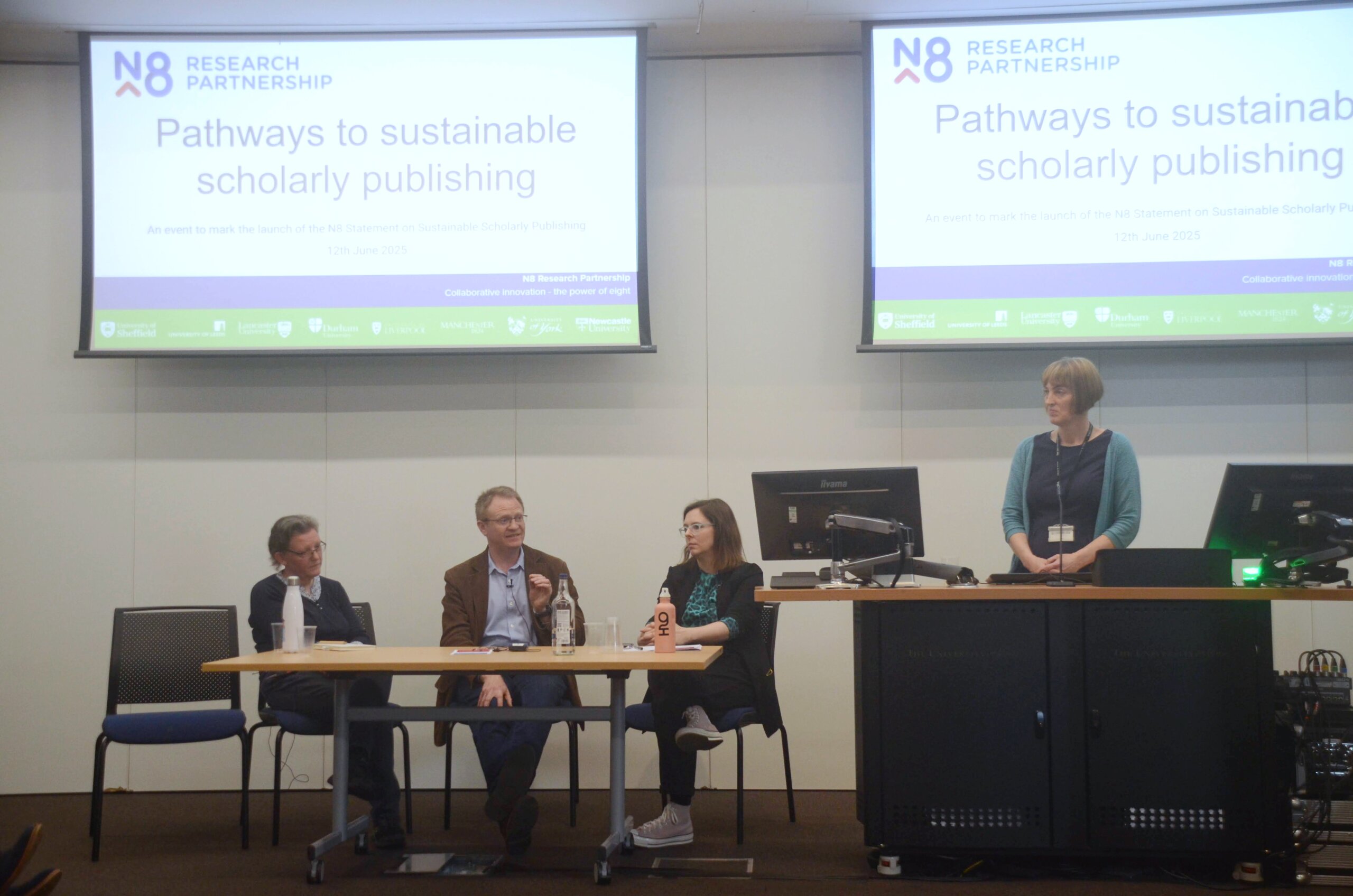
Remembering Elaine Sykes and advancing inclusive research culture
The event wrapped up with a panel session on research communication and civic engagement, chaired by Andrew Barker, Director of Library Services & Learning Development at Lancaster University.
Before beginning the session, Andrew paid a warm tribute to his colleague and friend Elaine Sykes, Head of Open Research at Lancaster University, whose sudden and unexpected death was confirmed earlier that week.
“Elaine was deeply involved in this work. She drafted an early iteration of it and was absolutely committed to the principles of open research. Everything we’re trying to do here today – she should have been a part of it. In fact, she was planning to be here. It’s utterly heartbreaking to be standing here saying this instead,“ said Andrew.
“There are many people in this room who knew her. And if you did, you’ll understand when I say, you just loved her. It’s that simple. For those of you who didn’t have the chance to know her, I’m sorry because you missed the opportunity to work with the best person I’ve ever worked with – she was extraordinary. I will miss her enormously.”
The subsequent closing panel event centered around the efforts and challenges of creating a more inclusive, accessible, and representative research culture within academia. It featured contributions by Dr Emma Yhnell (Reader & Associate Dean for Equality, Diversity and Inclusion, College of Biomedical & Life Sciences at Cardiff University) Clau Nader (Research Associate at University of York) and Dr Kate Lancaster, (Lecturer in the School of Physics, Engineering and Technology, University of York).
The panel discussed the systemic barriers in academia, especially the pressure to conform to outdated metrics such as publishing in high-impact journals.
In a fitting end to the day, our final panelists agreed that change often starts with a few brave voices, encouraging collective momentum toward a more just and inclusive research and publishing environment.
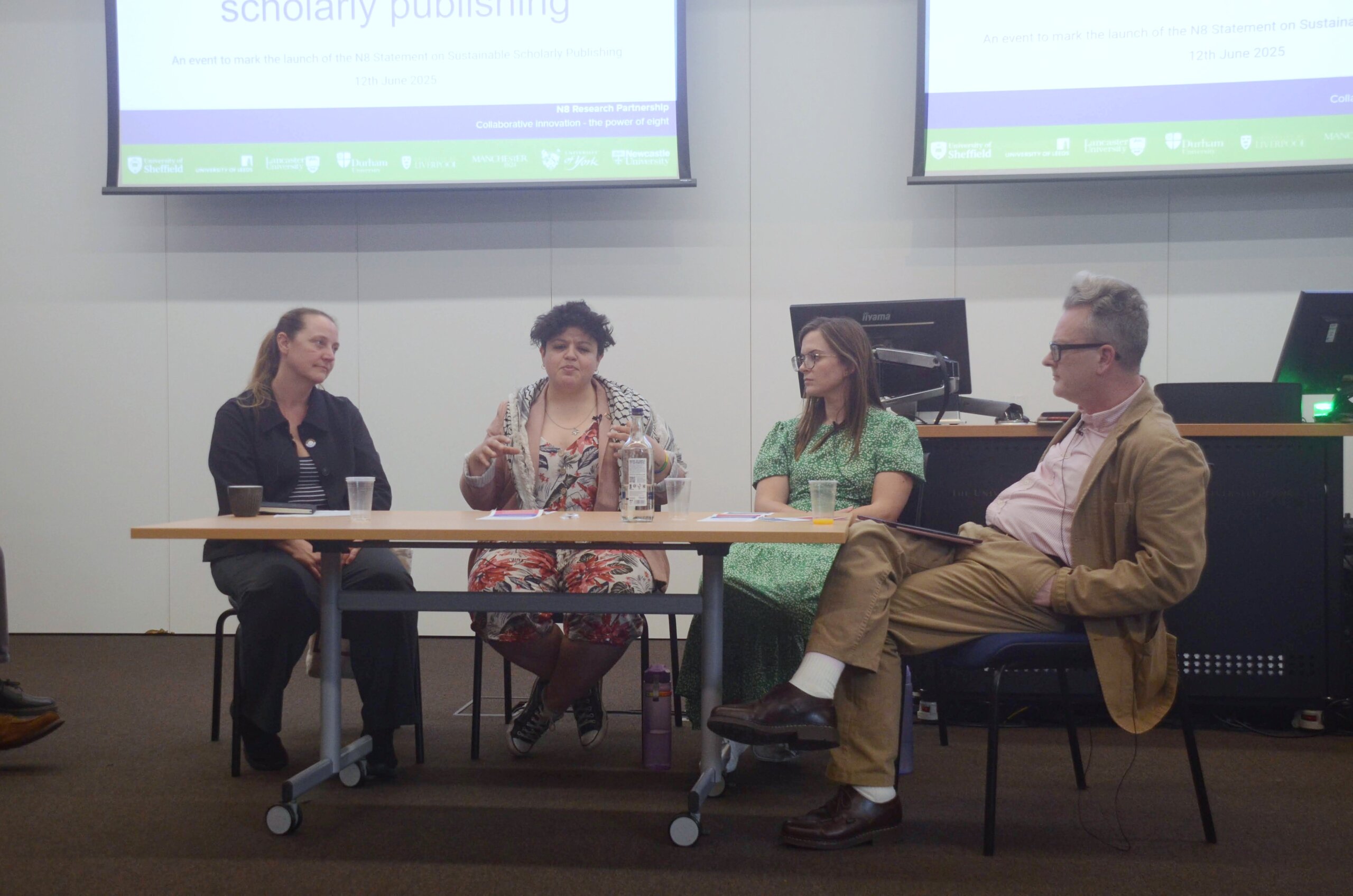
Conclusions
Growing consensus across stakeholders – Speakers from academia, libraries, funders and publishers all expressed support for more transparent, cost-effective, and inclusive publishing models. This cross-sector agreement reflects momentum toward systemic change.
Challenges with commercial publishers and metrics – Multiple speakers pointed to ongoing issues: rising costs, reliance on prestige metrics, and publisher opacity around pricing. These challenges disproportionately affect underfunded institutions and researchers, reflecting the importance of the N8’s intervention.
Emerging alternatives and transition models – Promising alternatives are being implemented, such as The Open Journals Collective, that aim to shift the cost burden away from individual researchers and toward community-supported, nonprofit-driven systems.
***